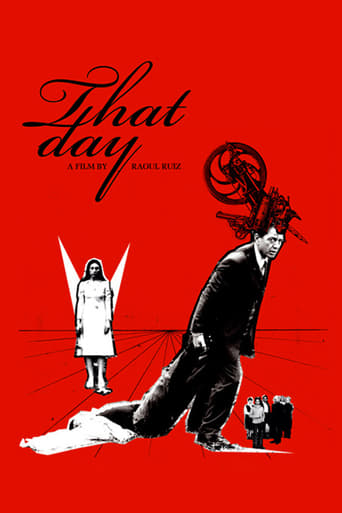tedg
I like Ruiz, I really do, and I'm glad there seems to be a bottomless bag of his films and a challenge to find.He's what I look for when I want that explicitly self-referential presentation style, plus some clever narrative tricks, but I don't want to have to wrestle angels to death. He's heavy in the way he works, and usually light in what he works toward. That allows me to see these as essays on storytelling instead of stories.The story here, which you won't understand until the end, is a simple conspiracy. Its remarkably simple and straightforward.But the way it is presented is remarkably puzzling, and ever so much more engaging than an ordinary narrative. It involves some crazy folks and "normal" folks that also seem logically impaired. There's the obvious, that this is seen as a demented mind would, all arrayed higgledy piggledy. And the result is also obvious, that only the demented are simple enough to be true, an irony since the presentation is extremely complex. It reminds me of Aaron Copeland's fantastic elaborations on "Tis a Gift to be Simple."Before ten minutes are elapsed, we have a woman get up from a dinner table, walk over to the camera, look directly into it and then clean the lens. That lens goes astigmatic when one of our endearing nutcases loses it. Previously he sees a window as a mirror as we look at him through it. His mania includes giving proper names to inanimate objects: hers (there's a loopy woman) is poetry. As with many narrative experiments, there are detectives. But instead of being our representatives, they decide to "do nothing." Its a very clever and unsettling trick. We want to kick them because we fear we won't know what is going on until they do. The chief detective says that he can't figure things out because he is too much in the present while his partner is in the future. Meanwhile, as they waste time in the pub, someone is completing a crossword puzzle with the proper names of the characters we meet.There are other cool narrative games, all lighthearted. Our crazy couple dances with his cheek not against hers, but against a painting she holds. A puzzling force in the story is "salsox" which we find at the end is a rather complex, almost supernatural condiment that might be the cause of this enriched world.Suppose you want to have a light evening and you don't want to damage yourself with some gross comic. Here's your movie.Ted's Evaluation -- 3 of 3: Worth watching.
pmercken
This is by far the best absurdistic film I have seen in a long time. It reminds me of Godard's Pierrot le fou (1965), but it has a real be it absolutely insane coherent plot and it is not a road movie. Luis Buñuel springs also to mind. There is for instance a scene reminiscent of the horror of 'the last supper scene' in Viridiana and of the famous scene around the table in The secret charms of the bourgeoisie.The combination of black comedy, crime, even horror, religion and superstition, politics and global economy gives the film so many layers of meaning that they are hard to grasp in one big scoop.And I forget psychology (various kinds of insanity, the effects of blackmail, the workings of gossip) and the mythology of redeeming love and loyalty.But above all, it is a funny film. Funny in its actions, including the sudden position reversal of mortal combatants, funny in its dialogs (one-liners, huge understatements), funny in the juxtaposition of horror and the most mundane everyday life. It is full of the unexpected, surprises galore, and full of subtle and not so subtle hints that keep the viewer alert. It also has a happy rhythm of wild action and serene stills.Do not expect the wallowing in blood of Quentin Tarantino's Killing Bill. Ce jour-là is a much lighter film and it is not one-dimensional, thanks to the already mentioned surfeit of connotations.May I add that it is also a moral tale with a happy ending? And it ridicules the Swiss: Alain Tanner with a vengeance.
bradluen
In this comedy of homicidal manners, people keep trying to kill both the sprite-like madwoman Livia (Elsa Zylberstein, gorgeously weightless) and her would-be assassin, the tottering madman Pointpoirot (Bernard Giraudeau, appropriately blank), and naturally there's a huge inheritance and a government conspiracy involved. Ruiz's staging is flawless, and the killing scenes in particular are exemplary - he knows when it's funnier to follow the characters, and when it's funnier to sit the camera dead still. I don't know if it all means any more than "Battle Royale" - Zylberstein said that Ruiz came to the conclusion in mid-shoot that it was a metaphor for Pinochet's violence, which may or may not be consistent with what we see on screen. Still, at least it takes the trouble to set up jokes properly, and it's not till the last third that they start seeming repetitive. I'm more or less neutral on this one.
themarina1
This is a great movie. From the very beginning it's clear that this isn't a typical comedy or a typical drama. However odd, it works. Each murder is committed under such strange circumstances that they create great comic moments. If you go to see this, stay 'till the end. It's all explained (however vaguely). Very, very funny.


